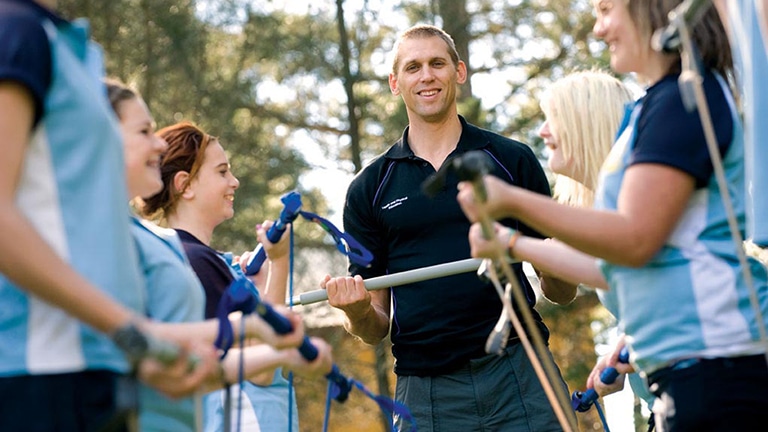
The iPlay fitness program, an evolution of HMRI’s SCORES, has more than halved cardiovascular disease risk in primary school kids.

Cardiovascular disease risk in kids due to poor aerobic fitness has been cut by more than half in primary schools using a new online physical activity training program for teachers.
Developed by the University of Newcastle’s Priority Research Centre for Physical Activity and Nutrition and the Australian Catholic University’s Institute for Positive Psychology and Education, the pilot program delivered the dramatic heart health and aerobic fitness improvements in a published study of 460 children.
The study evolved from a project called SCORES, which was seed-funded by the Hunter Medical Research Institiute through the Newcastle Gastronomic Lunch and Newcastle Jets. Now named iPLAY, it has now been rolled out to more than 20,000 NSW state primary school students in 83 schools throughout the state.
iPLAY aims to involve students in 150 minutes of planned physical activity each week, including high-quality physical education and school sport, and two to three ‘classroom energiser’ breaks.
Schools are also encouraged to provide physically active homework once per week, after-school physical activity at least once a week, and physical activity during recess and lunch. Parents are engaged through physical activity newsletters and parent information evenings.
University of Newcastle’s Professor David Lubans, co-creator of SCORES and iPLAY, said the program helped teachers to promote physical activity at school as well as forge crucial partnerships with parents, community sport and recreation clubs to encourage activity beyond the school setting.
“Currently in NSW, primary school teachers’ university training tends to focus largely on teaching of literacy and numeracy, with little time spent specifically on physical education and physical activity promotion,” he said.
“iPLAY gives teachers the confidence to ensure they are running effective PE and sport lessons. It provides them with fresh, evidence-based content to enhance health, wellbeing and learning. It also shows teachers how to use physical activity breaks between academic lessons to enhance student concentration. In short, it gives the students both fitness and focus.”
iPLAY co-creator, ACU’s Chris Lonsdale, said it was a game-changer for improving aerobic fitness and heart health in children.
“As much of the course is online, teachers can learn iPLAY at any time,” Professor Lonsdale said.
“Teachers can also download hundreds of additional resources and lesson plans to help them improve students’ fitness and fundamental movement skills.”
Originally trialled in eight NSW schools, the study was published in Medicine and Science in Sport and Exercise which found students increased their aerobic fitness by more than 20 per cent over a 12-month period when their teacher had completed the professional development.
“This fitness increase was triple the amount when compared with children in schools that did not participate in the program,” Professor Lonsdale said.
“We are now testing iPLAY in a larger study with schools across NSW. Early results show the program is having a similar effect to what we saw in the original study.
“In the schools we studied that hadn’t received iPLAY, 16% of children showed aerobic fitness levels that were poor enough for them to be considered at risk of cardiovascular disease, but in the iPLAY schools fewer than 8 per cent of children were below this threshold. These are really encouraging findings.”
Funded by the NSW Department of Education and the National health and Medical Research Council, iPLAY is offered free for up to 150 NSW government primary schools.
Marton Public School principal Andrew Doyle said teachers had found iPLAY helpful when developing physical activity across the school.
“Marton Public students like to be active and this program has led to our students being engaged in fun and easy to follow physical education lessons,” Mr Doyle said.
“The sequence of lessons from the warm-up to the skill development and skills application is excellent and hopefully our students go home to enhance the skills learnt at school.
“Keeping our students active, healthy and motivated not just in the classroom, but outside as well, is the key to learning success. At Marton Public School we will continue to develop our knowledge and skills by using iPLAY successfully to keep our students fit, healthy and engaged learners.”
The free online program for teachers to use in the classroom is accredited by the NSW Education Standards Authority (NESA) and NSW government primary schools can register their interest at: http://iplay.org.au/
HMRI would like to acknowledge the Traditional Custodians of the land on which we work and live, the Awabakal and Worimi peoples, and pay our respects to Elders past and present. We recognise and respect their cultural heritage and beliefs and their continued connection to their land.

Hunter Medical Research Institute
We’re taking healthy further.
Locked Bag 1000
New Lambton
NSW, Australia, 2305



This site is protected by reCAPTCHA and the Google Privacy Policy and Terms of Service apply.
Copyright © 2024 Hunter Medical Research Institute | ABN: 27 081 436 919
Site by Marlin Communications
